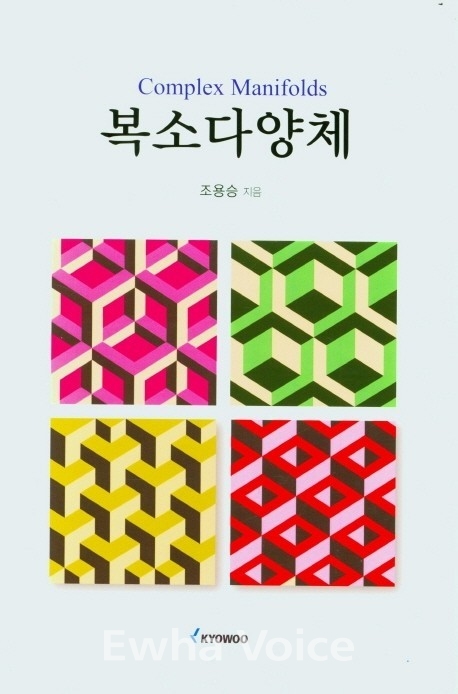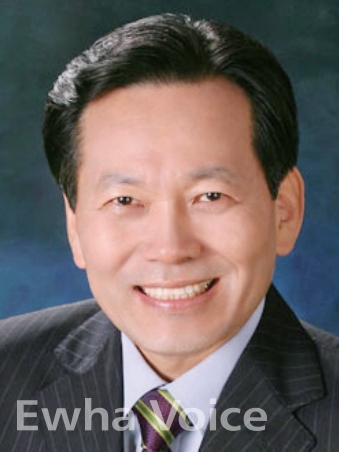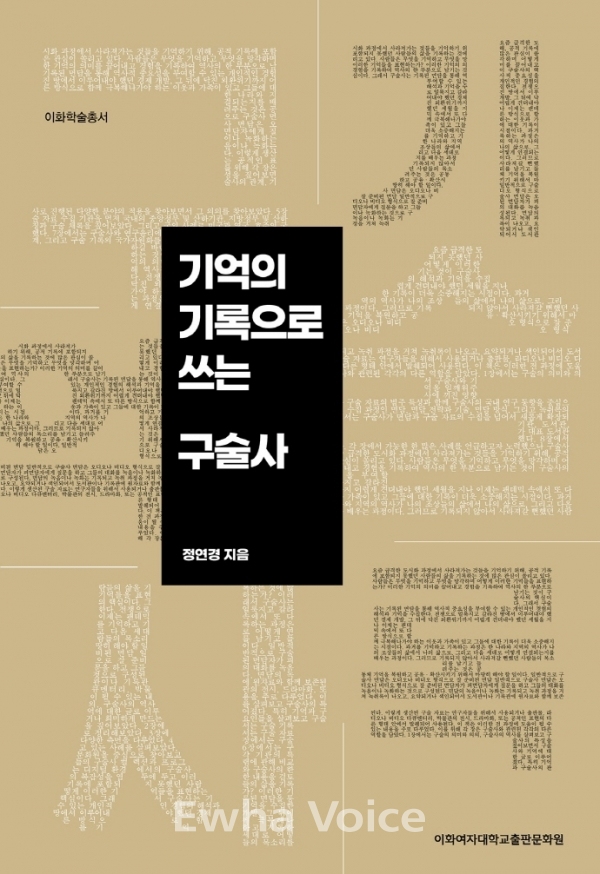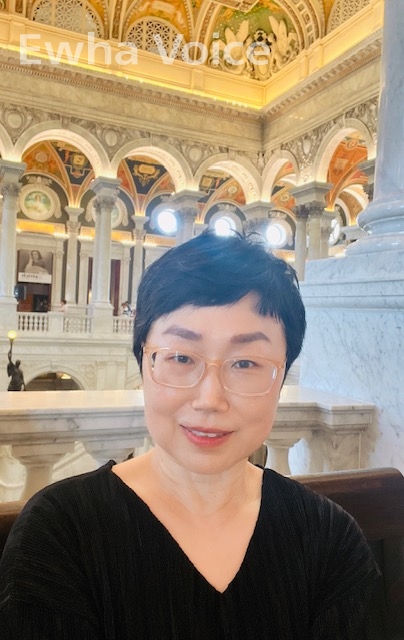The Outstanding Academic Books, a prestigious title nominated annually by the National Academy of Sciences (NAS), is awarded to a handful of written works every July. The chosen works are then purchased by the NAS itself to be distributed to public libraries, universities, and research centers. This July, five of the chosen Outstanding Academic Book finalists were written by none other than Ewha professors themselves.
“Complex Manifolds” by Professor Emeritus Cho Yong Seung

Professor Emeritus Cho Yong Seung from the Department of Mathematics was given the title of five-time nominee with his work “Complex Manifolds.”
After receiving his PhD in Geometric Topology at the University of Chicago, Cho has lectured at Ewha Womans University since 1989 and retired in 2015. He is also the founder of the National Institute for Mathematical Sciences (NIMS) and served as the chair of the Korean Mathematical Society (KMS).
When visiting the University of Michigan in the 1970s as a visiting scholar, Cho explained that he felt lacking in many mathematical areas, which made him determined to further study abroad before resuming his career as a university professor. He enrolled in the University of Chicago to pursue his Ph.D., where he encountered Geometric Topology as his greatest challenge.
While delving deeper to improve his knowledge on the topic, Cho was surprised to find himself profoundly immersed in Geometric Topology as a mathematical field itself, and since then, has been devoting his efforts to further research the subject.
Topology is a mathematical field often notorious for being complicated and difficult even for university students majoring in the topic.
Cho simply describes it as an abstraction and simplification of geometry. He elaborated that as long as space itself is not ripped apart or glued together, any object is considered the same, or homeomorphic, under any continuous deformation.
“In essence, a triangle is topologically the same as an octagon, the same way a ping-pong ball is the same as a rugby ball, while on the other hand, none of these balls can be considered the same as a ring-shaped doughnut.”
Following his numerous award-winning publications on geometric topology, his new book, “Complex Manifolds”, focuses on one of the complex Millennium Prize Problems, the Hodge Conjecture.
The Millennium Prize problems are the seven well-known difficult mathematical problems selected by the Clay Mathematics Institute in 2000, with a one-million-dollar prize for the first correct solution to each problem.
While working on the Hodge Conjecture, Cho realized other mathematicians, scholars, and students would benefit from an organized manual on the topic. Therefore, the book includes not only research on the Hodge Conjecture itself, but also various theorems such as cohomology and its decomposition, vector bundles, the Grassmannian Manifold, Kodaira embedding, and the Lefschetz Conjecture.
Cho recalled that the research, writing, and publication process of “Complex Manifolds” was extremely rewarding for him because it gave him the opportunity to step out of his usual field of studies and seek out his own solutions to an elaborate problem.

Photo provided by Cho Yong Seung
“I thoroughly enjoy challenging myself to explore new areas of research and attempt to deduct my own solutions,” he said.
Besides advanced research publications and university textbooks, Cho has also written many informational books on mathematics for non- majors.
Cho stressed the crucial role of mathematics within human development of the past centuries. He pointed out that even now, mathematical equations and functions lurk behind each part of our daily routine, down to our smallest gestures.
“Mathematics and its applications are vital now more than ever as we approach greater technological development in every aspect of our lives,” he emphasized. “We may not feel it now, but it is everywhere, in and out of our sight, and history has proven multiple times that national power and the nation’s mathematical development are in fact directly proportional.”
As a renowned professor and a pioneer in Korean mathematical research and education, Cho sees the future of Korean mathematical development as outstandingly promising.
“South Korea’s passion for education, paired with its aspiration and investment in scientific development is unrivaled in almost every aspect, which spells future success and flourishment for our mathematical sector,” he affirmed.
Currently, Cho resides in the United States and is conducting a project on the Calabi-Yau Manifold, an area stemming from Einstein’s works on General Relativity. He plans to further his research into various fields in the future.
“My aim is to always choose what is right over what is good, and I strive to make a better tomorrow than today.”
“Oral History Written by Records of Memory” by Professor Chung Yeon Kyoung

Professor Chung Yeon Kyoung received the Outstanding Academic Book Award with her 2022 publication, “Oral History Written by Records of Memory.”
Chung is an Ewha alumna from the class of 1985, who further pursued her studies post-graduation in Indiana University, graduating with a Ph.D. in Library and Information Science. She has been lecturing at Ewha Womans University since 1995, and currently serves as the Department Chair of Library Information and Science, the Director of the Institute of Archives of Records Management, as well as a committee chair of the Korean Library Association Press.
“Oral History Written by Records of Memory” focuses on oral history throughout time, a theme that may strike some as unusual or unfamiliar, especially during the digital era.
Chung began her research on oral history in 2012 with the project “A Study on Thesaurus Development Based on Women’s Oral History Records in Modern Korea” and has since been consistently conducting research in this area.
Her motivation to start writing this particular book came from the realization that society in general lacks knowledge and a form of guidance to what oral history is.
The book focuses on how research on oral history has been conducted from the very beginning to the present, especially on the progress outside of Korea. Chung explained that she endeavored to diversify the areas and perspectives within the book, which took more than three years of prior analysis and organization.
Chung’s biggest obstacle was translating, understanding, and accurately relaying the contents of the myriad of foreign documents and theses on oral history. She traveled to various countries such as the United States, Britain, and Australia to visit national libraries and collect data in person.
However, Chung admitted that in retrospect, these most difficult parts of her research also happen to be the most rewarding aspects of her publication process because it enabled her to have engaging dialogues with numerous librarians and researchers who enthusiastically assisted her with her work.
“My strenuous research and data collection process may have been a lot of work at the time, but it is what eventually led me to receive the Outstanding Academic Book Award, as well as a commendation from the president in the Record Management sector,” Chung acknowledged.
A must-read section from “Oral History Written by Records of Memory” that Chung herself recommends is the fourth chapter, where she delves into how diversely research on oral history can be carried out. She emphasizes in particular that South Korea needs more innovative routes in this area now more than ever.
Because this book is not overly academic or challenging to understand, Chung recommends it not only to scholars but to everyone interested in oral history, and those who want to record their own or their loved ones’ verbal memories into written form.

Photo provided by Chung Yeon Kyoung
“This book can help you look back on yourself and your experiences more objectively as you document your memories,” Chung explained. “It will also make you see the significance and value of oral history in human culture.”
Chung also disclosed that working on a book while simultaneously teaching and working on other fields of research was not always smooth going. She expressed her gratitude for the Ewha Womans University Press Council for supporting her throughout the entire process, and named time management as the vital factor for publishing her work.
“What is most important is how you perceive the situation and how you accordingly put your plans into action.”

